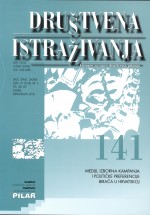THE EFFECTS OF ECOLOGICAL FAMILY DISADVANTAGE ON MALE AND FEMALE ADOLESCENT DELINQUENCY
THE EFFECTS OF ECOLOGICAL FAMILY DISADVANTAGE ON MALE AND FEMALE
ADOLESCENT DELINQUENCY
Author(s): Ivana Vrselja, Mario Pandžić, Tajana LJUBIN GOLUBSubject(s): Gender Studies, Behaviorism, Evaluation research, Family and social welfare
Published by: Institut društvenih znanosti Ivo Pilar
Keywords: ecological family disadvantage; delinquency; parental monitoring; peers; gender;
Summary/Abstract: The purpose of this paper is to examine the direct and serial indirect effects of ecological family disadvantage on adolescent male and female delinquency through poor parental monitoring and deviant peer association. Data used in this paper are collected on a sample of 528 Croatian high-school students (374 males) aged between 15 and 17. Participants self-reported their delinquency, and completed questionnaires about their familial disadvantage, parental monitoring, and their association with deviant peers. PROCESS macro for SPSS was used to test the proposed direct and indirect effects. The results showed that ecological family disadvantage had a direct effect on more pronounced male delinquency. There was no significant serial indirect effect of ecological family disadvantage on male delinquency through the two presumed mediators, but there was significant indirect effect of ecological family disadvantage on male delinquency through their increased deviant peer association. In females, no significant direct or indirect effects were found. The results point to gender specific mechanisms by which ecological family disadvantage contributes to adolescent delinquency, and thus make a significant contribution to the literature on this topic.
Journal: Društvena istraživanja - Časopis za opća društvena pitanja
- Issue Year: 27/2018
- Issue No: 3
- Page Range: 539-559
- Page Count: 21
- Language: English

